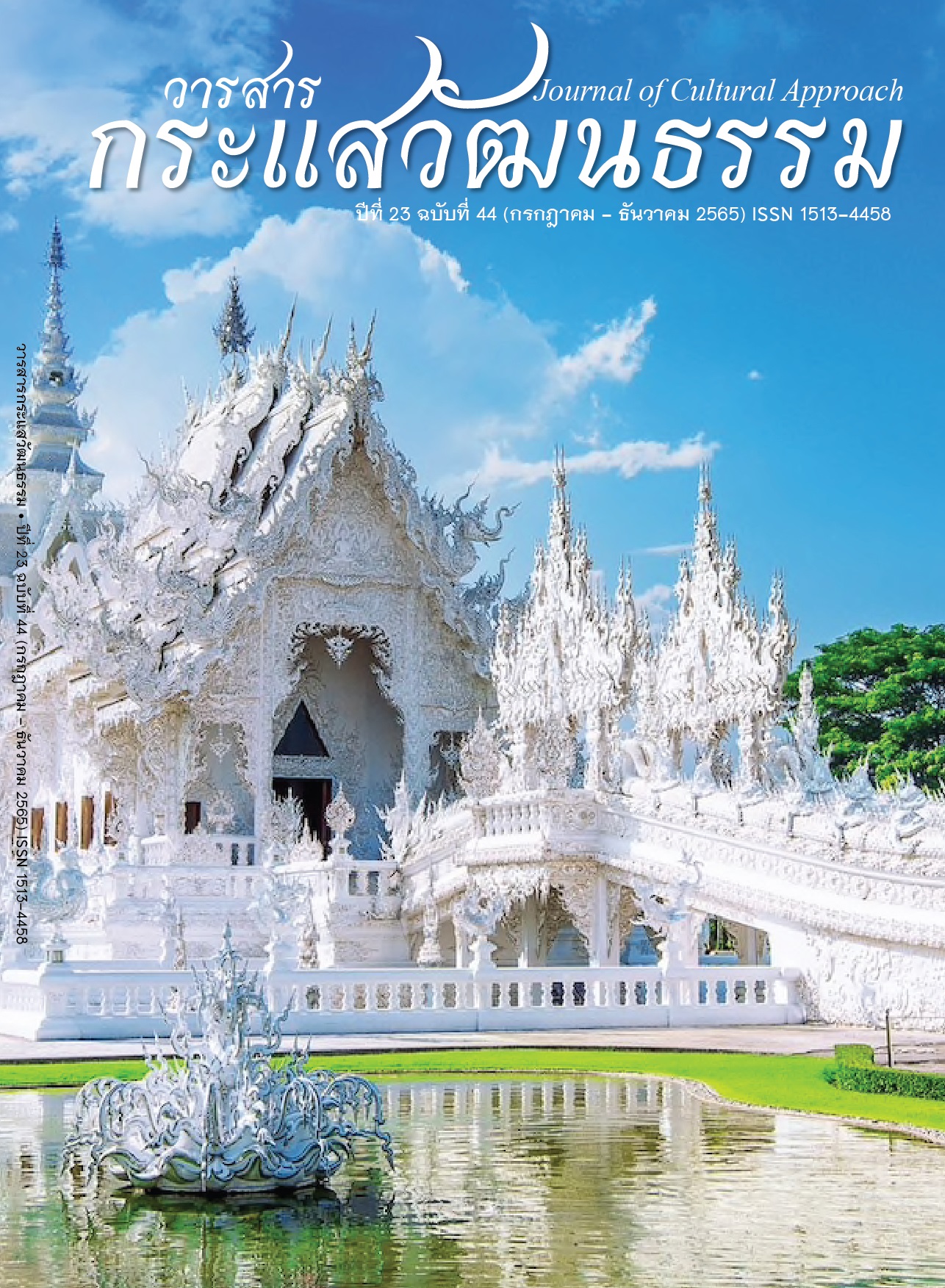แนวทางการจัดการคุณค่ามรดกภูมิปัญญาทางวัฒนธรรมเชิงสร้างสรรค์เพื่อสร้างความยั่งยืนพื้นที่ชุมชนลุ่มแม่น้ำสุพรรณบุรี ประเทศไทย
Main Article Content
บทคัดย่อ
บทความวิจัยนี้ มีวัตถุประสงค์เพื่อสำรวจมรดกภูมิปัญญาทางวัฒนธรรมชุมชนลุ่มแม่น้ำสุพรรณบุรี จัดการระบบคุณค่ามรดกภูมิปัญญาทางวัฒนธรรมชุมชนลุ่มแม่น้ำสุพรรณบุรี และเสนอแนวทางการจัดการคุณค่ามรดกภูมิปัญญาทางวัฒนธรรมเชิงสร้างสรรค์เพื่อความยั่งยืนพื้นที่ชุมชนลุ่มแม่น้ำสุพรรณบุรี ใช้การวิจัยเชิงคุณภาพโดยกระบวนการการจัดการความรู้จากพื้นที่ต้นแบบในรูปคู่มือและถ่ายทอดความรู้ด้วยการอบรมเชิงปฏิบัติการในพื้นที่ 2 ชุมชนลุ่มแม่น้ำสุพรรณบุรี รวบรวมข้อมูลด้วยการวิเคราะห์เอกสารร่วมกับการศึกษาภาคสนาม การสัมภาษณ์เชิงลึก การสังเกตแบบไม่มีส่วนร่วม และการสนทนากลุ่มเพื่อวิเคราะห์ สังเคราะห์แนวทางการจัดการคุณค่ามรดกภูมิปัญญาทางวัฒนธรรมเชิงสร้างสรรค์เพื่อความยั่งยืนพื้นที่ชุมชนลุ่มแม่น้ำสุพรรณบุรี กำหนดกลุ่มผู้ให้ข้อมูลสำคัญด้วยวิธีเจาะจงเลือก ดังนี้ 1) ปราชญ์ชุมชน จำนวน 23 คน 2) ตัวแทนชุมชนที่มีส่วนร่วมในด้านการพัฒนาการท่องเที่ยว จำนวน 15 คน 3) ตัวแทนสมาชิกกลุ่มแม่บ้านตามบัญชีรายชื่อกลุ่มสัมมาชีพจำนวน 25 คน และ 4) ผู้ให้ข้อมูลเพิ่มเติมจาก Snowball Technique จำนวน 14 คน
การวิเคราะห์เชิงเนื้อหาพบว่า ชุมชนลุ่มแม่น้ำสุพรรณบุรีปรากฏมรดกภูมิปัญญาทางวัฒนธรรม 7 ด้าน โดยมรดกภูมิปัญญาทางวัฒนธรรมด้านศิลปะการแสดง วรรณกรรมพื้นบ้าน แนวปฏิบัติทางสังคม พิธีกรรมและงานเทศกาล ล้วนได้รับอิทธิจากศาสนาและวิถีการดำเนินชีวิตริมแม่น้ำ ส่วนด้านภาษามีความเป็นเอกลักษณ์สูง เมื่อนำไปจัดการระบบคุณค่ามรดกภูมิปัญญาทางวัฒนธรรมของชุมชนได้ 4 ลักษณะคือ คุณค่าเชิงสัญลักษณ์ คุณค่าเชิงวิชาการ คุณค่าเชิงสุนทรียะ และคุณค่าเชิงเศรษฐกิจ สำหรับแนวทางการจัดการคุณค่ามรดกภูมิปัญญาทางวัฒนธรรมเชิงสร้างสรรค์เพื่อสร้างความยั่งยืนพื้นที่ชุมชนลุ่มแม่น้ำสุพรรณบุรีโดยรูปแบบการท่องเที่ยวชุมชนเชิงสร้างสรรค์ เพื่อมุ่งใช้ประโยชน์ต้นทุนทางวัฒนธรรมที่มีโดยกระบวนการชุมชนให้เป็นกลไกการพัฒนาและปกป้องคุ้มครองมรดกภูมิปัญญาทางวัฒนธรรมให้ยั่งยืนในระยะยาว ดังนี้ 1) การจัดการเรื่องราวเชิงสร้างสรรค์ 2) การจัดกิจกรรมท่องเที่ยวชุมชนเชิงสร้างสรรค์ 3) การจัดการสื่อสารเชิงสร้างสรรค์และ 4) การสร้างความยั่งยืนของการจัดการทรัพยากรและแหล่งท่องเที่ยวเชิงสร้างสรรค์
Article Details

อนุญาตภายใต้เงื่อนไข Creative Commons Attribution-NonCommercial-NoDerivatives 4.0 International License.
Proposed Creative Commons Copyright Notices
1. Proposed Policy for Journals That Offer Open Access
Authors who publish with this journal agree to the following terms:
- Authors retain copyright and grant the journal right of first publication with the work simultaneously licensed under a Creative Commons Attribution License that allows others to share the work with an acknowledgement of the work's authorship and initial publication in this journal.
- Authors are able to enter into separate, additional contractual arrangements for the non-exclusive distribution of the journal's published version of the work (e.g., post it to an institutional repository or publish it in a book), with an acknowledgement of its initial publication in this journal.
- Authors are permitted and encouraged to post their work online (e.g., in institutional repositories or on their website) prior to and during the submission process, as it can lead to productive exchanges, as well as earlier and greater citation of published work (See The Effect of Open Access).
Proposed Policy for Journals That Offer Delayed Open Access
Authors who publish with this journal agree to the following terms:
- Authors retain copyright and grant the journal right of first publication, with the work [SPECIFY PERIOD OF TIME] after publication simultaneously licensed under a Creative Commons Attribution License that allows others to share the work with an acknowledgement of the work's authorship and initial publication in this journal.
- Authors are able to enter into separate, additional contractual arrangements for the non-exclusive distribution of the journal's published version of the work (e.g., post it to an institutional repository or publish it in a book), with an acknowledgement of its initial publication in this journal.
- Authors are permitted and encouraged to post their work online (e.g., in institutional repositories or on their website) prior to and during the submission process, as it can lead to productive exchanges, as well as earlier and greater citation of published work (See The Effect of Open Access).
เอกสารอ้างอิง
Bonson, R. (2019). Sustainable Cultural Tourism Management of the Community in the Khong River Basin, Nong Khai Province. Pathumthani University Academic Journal, 11(1), 232–243.
Chinachot, P. & Chantuk, T. (2016). Model of Creative Tourism Management in Suan Phueng. Veridian E-Journal, Silpakorn University, 9(1), 250–268.
Choksunsap, Y. (2018). Adaptation of Koh San Chao Community under King Rama IX’s Philosophy for Sustainable Tourism in a Cultural Dimension. Journal of Social Science Research, 9(2), 383–394.
Court, S. & Wijesuriya, G. (2015). People-Centred Approaches to the Conservation of Cultural Heritage: Living Heritage. Paper Presented in the International Centre for the Study of the Preservation and Restoration of Cultural Property, Rome.
Department of Cultural Promotion (DCP). (2020). Cultural Heritage. Retrieved from http://ich.culture.go.th/index.php/th/ich/categories
Earth Summit Conference. (2000). Sustainable Tourism–Turning the Tide. Retrieved from http://www.earthsummit2002.org
George, R. (2001). Marketing South African Hospitality and Tourism. South Africa : Oxford Press.
Haochariean, K. (2015). Transformation for the Existence of the Waterfront Community Markets along the Chin River: A Case Study of Suphan Buri, Nakhon Pathom and Samut Sakhon Provinces. Journal of the Faculty of Architecture, 21(2), 28–42.
Howie, F. (2003). Managing the Tourist Destination. London : Thompson Learning.
Jaitae, S. (2014). Water Resource Management of Cultural Ecology. Ganesha Journal, 10(1), 13–23.
Jamieson, W. (2000). The Challenges of Sustainable Community Cultural Heritage Tourism. Paper Presented at the UNESCO Workshop on Cultural, Heritage Management and Tourism, Bhaktapur, Nepal.
Janpetch, K. & Siriwong, P. (2017). The Integration of Cultural Capital into a Creative Tourist Attraction through Participatory Process : A Case Study of Ban Chak Ngaew Community, Banglamung District in Chonburi Province. Journal of Community Development Research (Humanities and Social Sciences), 10(1), 111–121.
Kaewsanga, P. & Chamnongsri, N. (2012). Creative Tourism : A New Choice of Thai Tourism. Suranaree Journal of Social Science, 6(1), 91–109.
Mason, R. (2002). Assessing Values in Conservation Planning : Methodological Issues and Choices. In De La Torre, M. (Ed.), Assessing the Values of Cultural Heritage. Los Angeles : The Getty Conservation Institute.
Poulios, I. (2014). Past in the Present: A Living Heritage Approach–Meteora, Greece. London : Ubiquity Press.
Richard, G. (2010). Creative Tourism and Local Development. Retrieved from http://www.academia.edu/4386384/Creative_Tourism_and_Local_Development
Sangchumnong, A. (2018). Challenges of Cultural Heritage Communities to Sustainable Tourism Destination Development. Journal of Cultural Approach, 19(36), 82–91.
Sangsanitt, N. (2015). Creative Tourism. Bangkok : Cokun & Co.
Sriruk, C. (2020). Survey of Local Wisdom Heritage and Evaluation of Participatory Tourism Potential of Non Tun Community, Nong Bua Lamphu. Journal of International and Thai Tourism, 16(2), 22–42.
Thosuwonchinda, V. & Namwong, S. (2019). Creative Tourism and the Management of Activity Uniqueness with an Emphasis on Thai Food. Kasem Bundit Journal, 20(October), 127–142.
Torpanyacharn, K, (2021). A Comparative Study of the Successors Rights of the Promotion and Preservation of Intangible Cultural Heritage Act B.E. 2559 and the Intangible Cultural Heritage Convention 2003. Naresuan University Law Journal, 14(1), 1–25.
Vanishkorn, A. (2014). Thai Wisdom : Designing and Creating Contemporary Products. Journal of Cultural and Art Institution, 15(2), 22–28.
Wisutiluk, S. et al. (2011). Creative Tourism Thailand. Bangkok : Cokun & Co.
Yodsurang, P. (2020). People-Centered Approached to Conservation of Nature and Culture. Journal of Environmental Design, 7(1), 3–21.


